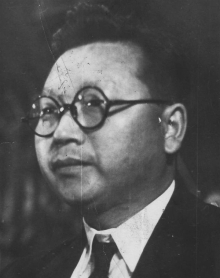Kang Ryang-uk: Difference between revisions
Finnusertop (talk | contribs) |
Ruling party (talk | contribs) |
||
| Line 34: | Line 34: | ||
[[Category:1902 births]] |
[[Category:1902 births]] |
||
[[Category:1983 deaths]] |
[[Category:1983 deaths]] |
||
[[Category:Members of the 1st Supreme People's Assembly]] |
|||
[[Category:Members of the 2nd Supreme People's Assembly]] |
|||
[[Category:Members of the 3rd Supreme People's Assembly]] |
|||
[[Category:Members of the 4th Supreme People's Assembly]] |
|||
Revision as of 10:58, 13 March 2021
This article needs additional citations for verification. (April 2014) |
| Kang Ryang-uk | |
 | |
| Korean name | |
|---|---|
| Chosŏn'gŭl | |
| Hancha | |
| Revised Romanization | Gang Ryang-uk |
| McCune–Reischauer | Kang Ryang'uk |
Kang Ryang-uk (Korean: 강량욱, 1 November 1904 [1][2] – 9 January 1983),[3] also spelled Kang Lyanguk, was a North Korean Presbyterian minister and Chairman of the Korean Christian Federation since 1946.[4]
Kang was the maternal uncle of North Korean Premier Kim Il-sung. Kim's mother, Kang's cousin, was Kang Pan-sok, who was also a devout Presbyterian.[4] In his early years, Kang he was a school teacher (one of his pupils was Kim Il Sung). In the 1940s he studied Theology at the Pyongyang University, and after he completed his study he became a minister.
Kang became one of the close advisers of Kim Il-Sung shortly after his return from the Soviet Union in October 1945. In 1946 he became the Chairman of the Christian League, later called the Korean Christian Federation. This organisation was in close contact with the Communist Party. In 1949 all Protestant Ministers were forced to join Kang's Christian Federation.
In the late 1940s, Kang became Deputy Chairman of the Korean Social Democratic Party (Korean Democratic Party), which was a close ally of the ruling Workers' Party of Korea.
He became the Chairman of the party in the 1950s.[5]
Kang later served as a deputy prime minister of North Korea and a secretary of the Supreme People's Assembly. He was appointed as Vice President by the Supreme People's Assembly in 1972 and he left the office in 1982.[6][7]
Kang's second son, Kang Yong-sop, later succeeded him as head of the Korean Christian Federation.[8]
References
- ^ "정세와기도 - 2017년 11월 9일 주여, 감사합니다". jubileeuni.com.
- ^ "12월 7일 오늘의 역사.. 대설, 미국 진주만 희생자 추모일". m.dailyjeonbuk.com.
- ^ Ap (12 January 1983). "Kang Ryang Uk, 79, a Leader Of North Korean Communists" – via NYTimes.com.
- ^ a b Armstrong, Charles (2016). "Political Religion". In Corner, Paul; Jie-Hyun Lim (eds.). The Palgrave Handbook of Mass Dictatorship. Springer. p. 76. ISBN 978-1-137-43763-1.
- ^ Weiser, Martin (September 14, 2015). "Voices from the Black Box: 1987, the Social Democratic Party, and Protection of Human Rights". Sino-NK. Retrieved 12 September 2018.
- ^ "Chiefs of State and Cabinet members of foreign governments / National Foreign Assessment Center. 1973Jan-June". HathiTrust. Retrieved 11 March 2019.
- ^ "Chiefs of State and Cabinet members of foreign governments / National Foreign Assessment Center. 1983Jan-June". HathiTrust. Retrieved 11 March 2019.
- ^ "North Korean Christian leader Kang Young-sup dies". Presbyterian Church USA. 2012-01-23. Retrieved 2014-03-24.
- North Korean Presbyterians
- Government ministers of North Korea
- Vice Presidents of North Korea
- Korean Social Democratic Party politicians
- 1902 births
- 1983 deaths
- Members of the 1st Supreme People's Assembly
- Members of the 2nd Supreme People's Assembly
- Members of the 3rd Supreme People's Assembly
- Members of the 4th Supreme People's Assembly
- North Korean politician stubs
- Christian clergy stubs
